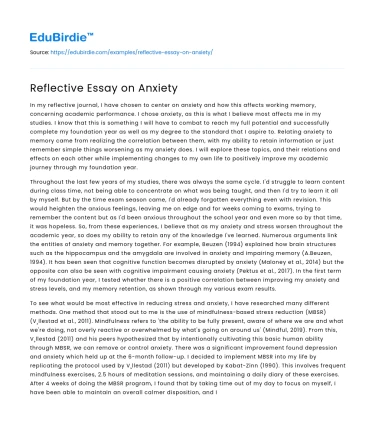In my reflective journal, I have chosen to center on anxiety and how this affects working memory, concerning academic performance. I chose anxiety, as this is what I believe most affects me in my studies. I know that this is something I will have to combat to reach my full potential and successfully complete my foundation year as well as my degree to the standard that I aspire to. Relating anxiety to memory came from realizing the correlation between them, with my ability to retain information or just remember simple things worsening as my anxiety does. I will explore these topics, and their relations and effects on each other while implementing changes to my own life to positively improve my academic journey through my foundation year.
Throughout the last few years of my studies, there was always the same cycle. I'd struggle to learn content during class time, not being able to concentrate on what was being taught, and then I'd try to learn it all by myself. But by the time exam season came, I'd already forgotten everything even with revision. This would heighten the anxious feelings, leaving me on edge and for weeks coming to exams, trying to remember the content but as I'd been anxious throughout the school year and even more so by that time, it was hopeless. So, from these experiences, I believe that as my anxiety and stress worsen throughout the academic year, so does my ability to retain any of the knowledge I've learned. Numerous arguments link the entities of anxiety and memory together. For example, Beuzen (1994) explained how brain structures such as the hippocampus and the amygdala are involved in anxiety and impairing memory (A.Beuzen, 1994). It has been seen that cognitive function becomes disrupted by anxiety (Maloney et al., 2014) but the opposite can also be seen with cognitive impairment causing anxiety (Pektus et al., 2017). In the first term of my foundation year, I tested whether there is a positive correlation between improving my anxiety and stress levels, and my memory retention, as shown through my various exam results.
Save your time!
We can take care of your essay
- Proper editing and formatting
- Free revision, title page, and bibliography
- Flexible prices and money-back guarantee
To see what would be most effective in reducing stress and anxiety, I have researched many different methods. One method that stood out to me is the use of mindfulness-based stress reduction (MBSR) (V¸llestad et al., 2011). Mindfulness refers to 'the ability to be fully present, aware of where we are and what we're doing, not overly reactive or overwhelmed by what's going on around us' (Mindful, 2019). From this, V¸llestad (2011) and his peers hypothesized that by intentionally cultivating this basic human ability through MBSR, we can remove or control anxiety. There was a significant improvement found depression and anxiety which held up at the 6-month follow-up. I decided to implement MBSR into my life by replicating the protocol used by V¸llestad (2011) but developed by Kabat-Zinn (1990). This involves frequent mindfulness exercises, 2.5 hours of meditation sessions, and maintaining a daily diary of these exercises. After 4 weeks of doing the MBSR program, I found that by taking time out of my day to focus on myself, I have been able to maintain an overall calmer disposition, and I have noticed a significant decrease in anxiety attacks throughout the week. As well as a slight increase in my summative and some formative test results that I interpret as an overall positive correlation; What I found most helpful in this process were the daily diaries. I completed these in the form of video diaries, as I found it a lot easier to express my feelings and experiences with MBSR verbally, as opposed to putting them in writing. Overall, I feel that this is definitely something I will continue to practice in the future, however, for this to be as successful as possible, I am going to have to tailor the MBSR protocol to better suit me as I am still struggling to retain as much information as I'd like, and not achieving the grades I want.
As the sole practice of MBSR has not benefitted me the way I would've liked, I further researched other techniques and found that Rosmarinus officinalis L. (rosemary) has antianxiety effects and overall benefits on insomnia, depression, and memory (Ribeiro-Santos et al., 2015). A clinical trial by Nematolahi (2018) evaluates the effects of consuming rosemary on things such as anxiety and memory in university students aged 20-25. He found that there was not only an improvement in anxiety, depression, and sleep quality but also significant effects on enhancing retrospective and prospective memory (Nematolahi et al., 2018). From this, I decided to begin drinking rosemary tea every evening and sometimes while studying. I instantly saw the promised improvements. I found that I have been able to study for longer periods of time, taking fewer breaks than I would normally have to. I feel more confident about the upcoming mock exams and hope my efforts and growth will be reflected in the subsequent results.
Overall, I will definitely be expanding and developing these practices further through my academic journey in University Education. However, I do hope to do more research and come to understand what truly works for me best.






 Stuck on your essay?
Stuck on your essay?

